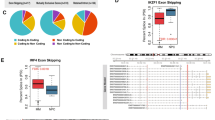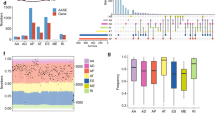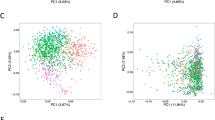Abstract
Background
Alternative splicing (AS) is a post-transcriptional process that produces transcript variants, thus leading to transcriptome complexity. Recently, the scope of AS studies has been greatly expanded toward clinical applications owing to the abundance of RNA sequencing data.
Objective
This review consists of two parts. We first summarize bioinformatic resources that are useful for large-scale cancer-related AS studies. We then highlight the research efforts to utilize AS events for predicting clinical outcomes and planning therapeutic strategies.
Results
Computational approaches to interrogate AS events have been reviewed under three categories: (1) databases to provide functional and clinical annotation of AS events, (2) analytical tools to identify cancer-associated AS event, and (3) methods to identify splicing-related DNA variants and splicing-derived neoantigens. We also present the recent progress in exploring the clinical utility of AS under four categories: (1) identification of AS events for cancer prognosis, (2) utilization of AS events in molecular classification of various cancers, (3) regulatory mechanisms of AS underlying drug resistance, and (4) potential use of AS in cancer therapy.
Conclusion
This review will be helpful for understanding the biological implications of AS in cancer and facilitate the development of AS markers for cancer prognosis and treatment. We anticipate that future studies will lead to the application of genome-wide AS profiles in cancer precision medicine.


Similar content being viewed by others
References
Baralle FE, Giudice J (2017) Alternative splicing as a regulator of development and tissue identity. Nat Rev Mol Cell Biol 18:437–451
Bowling EA, Wang JH, Gong F, Wu W, Neill NJ, Kim IS, Tyagi S, Orellana M, Kurley SJ, Dominguez-Vidana R et al (2021) Spliceosome-targeted therapies trigger an antiviral immune response in triple-negative breast cancer. Cell 184:384–403 e321
Cao S, Zhou DC, Oh C, Jayasinghe RG, Zhao Y, Yoon CJ, Wyczalkowski MA, Bailey MH, Tsou T, Gao Q et al (2020) Discovery of driver non-coding splice-site-creating mutations in cancer. Nat Commun 11:5573
Centa JL, Hastings ML (2022) Targeting alternative splicing for therapeutic interventions. Methods Mol Biol 2537:21–36
Chai RC, Li YM, Zhang KN, Chang YZ, Liu YQ, Zhao Z, Wang ZL, Chang YH, Li GZ, Wang KY et al (2019) RNA processing genes characterize RNA splicing and further stratify lower-grade glioma. JCI Insight 5
Chai S, Smith CC, Kochar TK, Hunsucker SA, Beck W, Olsen KS, Vensko S, Glish GL, Armistead PM, Prins JF et al (2022) NeoSplice: a bioinformatics method for prediction of splice variant neoantigens. Bioinform Adv 2:vbac032
Chen B, Deng T, Deng L, Yu H, He B, Chen K, Zheng C, Wang D, Wang Y, Chen G (2021a) Identification of tumour immune microenvironment-related alternative splicing events for the prognostication of pancreatic adenocarcinoma. BMC Cancer 21:1211
Chen Z, Chen C, Li L, Zhang T, Wang X (2021b) The spliceosome pathway activity correlates with reduced anti-tumor immunity and immunotherapy response, and unfavorable clinical outcomes in pan-cancer. Comput Struct Biotechnol J 19:5428–5442
Cheng R, Xu Z, Luo M, Wang P, Cao H, ** X, Zhou W, **ao L, Jiang Q (2022) Identification of alternative splicing-derived cancer neoantigens for mRNA vaccine development. Brief Bioinform 23
Climente-Gonzalez H, Porta-Pardo E, Godzik A, Eyras E (2017) The functional impact of alternative splicing in Cancer. Cell Rep 20:2215–2226
Danan-Gotthold M, Golan-Gerstl R, Eisenberg E, Meir K, Karni R, Levanon EY (2015) Identification of recurrent regulated alternative splicing events across human solid tumors. Nucleic Acids Res 43:5130–5144
Danis D, Jacobsen JOB, Carmody LC, Gargano MA, McMurry JA, Hegde A, Haendel MA, Valentini G, Smedley D, Robinson PN (2021) Interpretable prioritization of splice variants in diagnostic next-generation sequencing. Am J Hum Genet 108:1564–1577
Di C, Syafrizayanti, Zhang Q, Chen Y, Wang Y, Zhang X, Liu Y, Sun C, Zhang H, Hoheisel JD (2019) Function, clinical application, and strategies of Pre-mRNA splicing in cancer. Cell Death Differ 26:1181–1194
Dong C, Cesarano A, Bombaci G, Reiter JL, Yu CY, Wang Y, Jiang Z, Zaid MA, Huang K, Lu X et al (2021) Intron retention-induced neoantigen load correlates with unfavorable prognosis in multiple myeloma. Oncogene 40:6130–6138
Dong C, Reiter JL, Dong E, Wang Y, Lee KP, Lu X, Liu Y (2022) Intron-Retention Neoantigen load predicts favorable prognosis in pancreatic Cancer. JCO Clin Cancer Inform 6:e2100124
Dvinge H, Bradley RK (2015) Widespread intron retention diversifies most cancer transcriptomes. Genome Med 7:45
Foronda M (2021) RNA splicing meets anti-tumor immunity. Nat Cancer 2:1287
Hyung D, Kim J, Cho SY, Park C (2018) ASpedia: a comprehensive encyclopedia of human alternative splicing. Nucleic Acids Res 46:D58–D63
Jaganathan K, Kyriazopoulou Panagiotopoulou S, McRae JF, Darbandi SF, Knowles D, Li YI, Kosmicki JA, Arbelaez J, Cui W, Schwartz GB et al (2019) Predicting Splicing from primary sequence with deep learning. Cell 176:535–548 e524
Jayasinghe RG, Cao S, Gao Q, Wendl MC, Vo NS, Reynolds SM, Zhao Y, Climente-Gonzalez H, Chai S, Wang F et al (2018) Systematic analysis of splice-site-creating mutations in Cancer. Cell Rep 23:270–281 e273
Jun Y, Suh YS, Park S, Lee J, Kim JI, Lee S, Lee WP, Anczukow O, Yang HK, Lee C (2022) Comprehensive Analysis of Alternative Splicing in Gastric Cancer identifies epithelial-mesenchymal transition subtypes Associated with Survival. Cancer Res 82:543–555
Jung H, Lee D, Lee J, Park D, Kim YJ, Park WY, Hong D, Park PJ, Lee E (2015) Intron retention is a widespread mechanism of tumor-suppressor inactivation. Nat Genet 47:1242–1248
Kahles A, Lehmann KV, Toussaint NC, Huser M, Stark SG, Sachsenberg T, Stegle O, Kohlbacher O, Sander C, Cancer Genome Atlas Research N et al (2018) Comprehensive Analysis of Alternative Splicing Across Tumors from 8,705 patients. Cancer Cell 34:211–224 e216
Kahles A, Ong CS, Zhong Y, Ratsch G (2016) SplAdder: identification, quantification and testing of alternative splicing events from RNA-Seq data. Bioinformatics 32:1840–1847
Kim P, Yang M, Yiya K, Zhao W, Zhou X (2020) ExonSkipDB: functional annotation of exon skip** event in human. Nucleic Acids Res 48:D896–D907
Li K, Luo T, Zhu Y, Huang Y, Wang A, Zhang D, Dong L, Wang Y, Wang R, Tang D et al (2022) Performance evaluation of differential splicing analysis methods and splicing analytics platform construction. Nucleic Acids Res
Li YI, Knowles DA, Humphrey J, Barbeira AN, Dickinson SP, Im HK, Pritchard JK (2018) Annotation-free quantification of RNA splicing using LeafCutter. Nat Genet 50:151–158
Ling JP, Wilks C, Charles R, Leavey PJ, Ghosh D, Jiang L, Santiago CP, Pang B, Venkataraman A, Clark BS et al (2020) ASCOT identifies key regulators of neuronal subtype-specific splicing. Nat Commun 11:137
Liu H, Dai J, Li K, Sun Y, Wei H, Wang H, Zhao C, Wang DW (2022) Performance evaluation of computational methods for splice-disrupting variants and improving the performance using the machine learning-based framework. Brief Bioinform 23
Lu SX, De Neef E, Thomas JD, Sabio E, Rousseau B, Gigoux M, Knorr DA, Greenbaum B, Elhanati Y, Hogg SJ et al (2021) Pharmacologic modulation of RNA splicing enhances anti-tumor immunity. Cell 184:4032–4047 e4031
Mehmood A, Laiho A, Venalainen MS, McGlinchey AJ, Wang N, Elo LL (2020) Systematic evaluation of differential splicing tools for RNA-seq studies. Brief Bioinform 21:2052–2065
Murphy AJ, Li AH, Li P, Sun H (2022) Therapeutic targeting of alternative splicing: a New Frontier in Cancer Treatment. Front Oncol 12:868664
Nilsen TW, Graveley BR (2010) Expansion of the eukaryotic proteome by alternative splicing. Nature 463:457–463
Pan Q, Shai O, Lee LJ, Frey BJ, Blencowe BJ (2008) Deep surveying of alternative splicing complexity in the human transcriptome by high-throughput sequencing. Nat Genet 40:1413–1415
Park J, Kim D, Lee JO, Park HC, Ryu BY, Kim JH, Lee SH, Chung YJ (2022a) Dissection of molecular and histological subtypes of papillary thyroid cancer using alternative splicing profiles. Exp Mol Med 54:263–272
Park J, Lee JO, Lee M, Chung YJ (2022b) AS-CMC: a pan-cancer database of alternative splicing for molecular classification of cancer. Sci Rep 12:21074
Reviejo M, Soto M, Lozano E, Asensio M, Martinez-Augustin O, Sanchez de Medina F, Marin JJG (2021) Impact of alternative splicing on mechanisms of resistance to anticancer drugs. Biochem Pharmacol 193:114810
Ryan M, Wong WC, Brown R, Akbani R, Su X, Broom B, Melott J, Weinstein J (2016) TCGASpliceSeq a compendium of alternative mRNA splicing in cancer. Nucleic Acids Res 44:D1018–1022
Ryan MC, Cleland J, Kim R, Wong WC, Weinstein JN (2012) SpliceSeq: a resource for analysis and visualization of RNA-Seq data on alternative splicing and its functional impacts. Bioinformatics 28:2385–2387
Sahin I, George A, Seyhan AA (2021) Therapeutic targeting of alternative RNA splicing in gastrointestinal Malignancies and other cancers.Int J Mol Sci22
Schafer S, Miao K, Benson CC, Heinig M, Cook SA, Hubner N (2015) Alternative splicing Signatures in RNA-seq data: percent spliced in (PSI). Curr Protoc Hum Genet 87:11 11–11 16 14
Sciarrillo R, Wojtuszkiewicz A, Assaraf YG, Jansen G, Kaspers GJL, Giovannetti E, Cloos J (2020) The role of alternative splicing in cancer: from oncogenesis to drug resistance. Drug Resist Updat 53:100728
Sebestyen E, Singh B, Minana B, Pages A, Mateo F, Pujana MA, Valcarcel J, Eyras E (2016) Large-scale analysis of genome and transcriptome alterations in multiple tumors unveils novel cancer-relevant splicing networks. Genome Res 26:732–744
Seiler M, Peng S, Agrawal AA, Palacino J, Teng T, Zhu P, Smith PG, Cancer Genome Atlas Research N, Buonamici S, Yu L (2018) Somatic Mutational Landscape of Splicing factor genes and their functional consequences across 33 Cancer types. Cell Rep 23:282–296 e284
Shen S, Park JW, Lu ZX, Lin L, Henry MD, Wu YN, Zhou Q, **ng Y (2014) rMATS: robust and flexible detection of differential alternative splicing from replicate RNA-Seq data. Proc Natl Acad Sci U S A 111:E5593–5601
Siddaway R, Milos S, Vadivel AKA, Dobson THW, Swaminathan J, Ryall S, Pajovic S, Patel PG, Nazarian J, Becher O et al (2022) Splicing is an alternate oncogenic pathway activation mechanism in glioma. Nat Commun 13:588
Smart AC, Margolis CA, Pimentel H, He MX, Miao D, Adeegbe D, Fugmann T, Wong KK, Van Allen EM (2018) Intron retention is a source of neoepitopes in cancer. Nat Biotechnol 36:1056–1058
Stanley RF, Abdel-Wahab O (2022) Dysregulation and therapeutic targeting of RNA splicing in cancer. Nat Cancer 3:536–546
Suh YS, Na D, Lee JS, Chae J, Kim E, Jang G, Lee J, Min J, Ock CY, Kong SH et al (2022) Comprehensive molecular characterization of Adenocarcinoma of the Gastroesophageal Junction between Esophageal and gastric adenocarcinomas. Ann Surg 275:706–717
Tian J, Wang Z, Mei S, Yang N, Yang Y, Ke J, Zhu Y, Gong Y, Zou D, Peng X et al (2019) CancerSplicingQTL: a database for genome-wide identification of splicing QTLs in human cancer. Nucleic Acids Res 47:D909–D916
Trincado JL, Entizne JC, Hysenaj G, Singh B, Skalic M, Elliott DJ, Eyras E (2018) SUPPA2: fast, accurate, and uncertainty-aware differential splicing analysis across multiple conditions. Genome Biol 19:40
Vaquero-Garcia J, Barrera A, Gazzara MR, Gonzalez-Vallinas J, Lahens NF, Hogenesch JB, Lynch KW, Barash Y (2016) A new view of transcriptome complexity and regulation through the lens of local splicing variations. Elife 5:e11752
Wang ET, Sandberg R, Luo S, Khrebtukova I, Zhang L, Mayr C, Kingsmore SF, Schroth GP, Burge CB (2008) Alternative isoform regulation in human tissue transcriptomes. Nature 456:470–476
Wang Q, Xu T, Tong Y, Wu J, Zhu W, Lu Z, Ying J (2019) Prognostic potential of alternative splicing markers in Endometrial Cancer. Mol Ther Nucleic Acids 18:1039–1048
Watson PA, Arora VK, Sawyers CL (2015) Emerging mechanisms of resistance to androgen receptor inhibitors in prostate cancer. Nat Rev Cancer 15:701–711
Wu S, Huang Y, Zhang M, Gong Z, Wang G, Zheng X, Zong W, Zhao W, **ng P, Li R et al (2022) ASCancer Atlas: a comprehensive knowledgebase of alternative splicing in human cancers. Nucleic Acids Res
Xu Y, Huangyang P, Wang Y, Xue L, Devericks E, Nguyen HG, Yu X, Oses-Prieto JA, Burlingame AL, Miglani S et al (2021) ERalpha is an RNA-binding protein sustaining tumor cell survival and drug resistance. Cell 184:5215–5229 e5217
Zhang D, Lu W, Zhuo Z, Mei H, Wu X, Cui Y (2022a) Construction of a breast cancer prognosis model based on alternative splicing and immune infiltration. Discov Oncol 13:78
Zhang S, Mao M, Lv Y, Yang Y, He W, Song Y, Wang Y, Yang Y, Al Abo M, Freedman JA et al (2022b) A widespread length-dependent splicing dysregulation in cancer. Sci Adv 8:eabn9232
Zhang Y, Wu X, Li J, Sun K, Li H, Yan L, Duan C, Liu H, Chen K, Ye Z et al (2021) Comprehensive characterization of alternative splicing in renal cell carcinoma.Brief Bioinform22
Zhang Y, Yan L, Zeng J, Zhou H, Liu H, Yu G, Yao W, Chen K, Ye Z, Xu H (2019) Pan-cancer analysis of clinical relevance of alternative splicing events in 31 human cancers. Oncogene 38:6678–6695
Zhang Y, Yao X, Zhou H, Wu X, Tian J, Zeng J, Yan L, Duan C, Liu H, Li H et al (2022c) OncoSplicing: an updated database for clinically relevant alternative splicing in 33 human cancers. Nucleic Acids Res 50:D1340–D1347
Zhang Z, Zhou C, Tang L, Gong Y, Wei Z, Zhang G, Wang F, Liu Q, Yu J (2020) ASNEO: identification of personalized alternative splicing based neoantigens with RNA-seq. Aging 12:14633–14648
Acknowledgements
This research was supported by the Basic Science Research Program through the National Research Foundation (NRF), funded by the Ministry of Education (2022R1I1A1A01068731 and RS-2022-00165497).
Author information
Authors and Affiliations
Corresponding authors
Ethics declarations
Conflict of interest statement
Authors declare that there is no conflict of interest.
Additional information
Publisher’s note
Springer Nature remains neutral with regard to jurisdictional claims in published maps and institutional affiliations.
Rights and permissions
Springer Nature or its licensor (e.g. a society or other partner) holds exclusive rights to this article under a publishing agreement with the author(s) or other rightsholder(s); author self-archiving of the accepted manuscript version of this article is solely governed by the terms of such publishing agreement and applicable law.
About this article
Cite this article
Park, J., Park, J. & Chung, YJ. Alternative splicing: a new breakthrough for understanding tumorigenesis and potential clinical applications. Genes Genom 45, 393–400 (2023). https://doi.org/10.1007/s13258-023-01365-x
Received:
Accepted:
Published:
Issue Date:
DOI: https://doi.org/10.1007/s13258-023-01365-x




